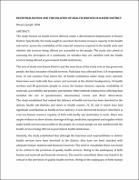Decentralization and the delivery of health services in Kasese District.
Abstract
The study focuses on health service delivery under a decentralized dispensation in Kasese District. Specifically, the study sought to ascertain the human resource capacity in the health sub sector, assess the availability of the material resources required in the health units and whether the services being offered are accessible to the people. The study also aimed at assessing the perception of a community on whether they are satisfied with the health services being offered at government health institutions.
The area of study was Kasese District and the main focus of the study was on the grassroots people, the final consumer of health services. Field data was collected from 118 respondents from 10 sub counties from where the 10 health institutions under study were selected. Interviews were held with four senior civil servants at the district headquarters, 34 health workers and 80 grassroots people to access the human resource capacity, availability of materials, accessibility and peoples’ perceptions. Other methods employed in collecting data included the use of questionnaire, documentary review and direct observation.
The study established that indeed the delivery of health services has been devolved to the district, health sub-districts and down to Health centers, IV, III and II which have had significant contribution on health service delivery. It was discovered however, that there is very low human resource capacity of 46% with hardly any motivation to work. There was ample evidence to show chronic shortage of drugs, medicines, equipment and supplies which make health services inaccessible to the people. As a result, people are not satisfied with the health services being offered at government health institutions.
Similarly, the study established that although the functions and responsibilities to deliver health services have been devolved to the district, they have not been matched with adequate human, material and financial resources. The need to consolidate these was found to be critical to the provision of quality health services. Owing to the inadequacy of both human and material and financial resources. The need to consolidate these was found to be critical to the provision of quality health services. Owing to the inadequacy of both human and material inputs, the study concludes that health services have remained inaccessible despite the improvements under decentralization. It recommends the enhancement of the human and material inputs for quality and accessible health service provision.
Collections
- Thesis and Dissertations [126]

